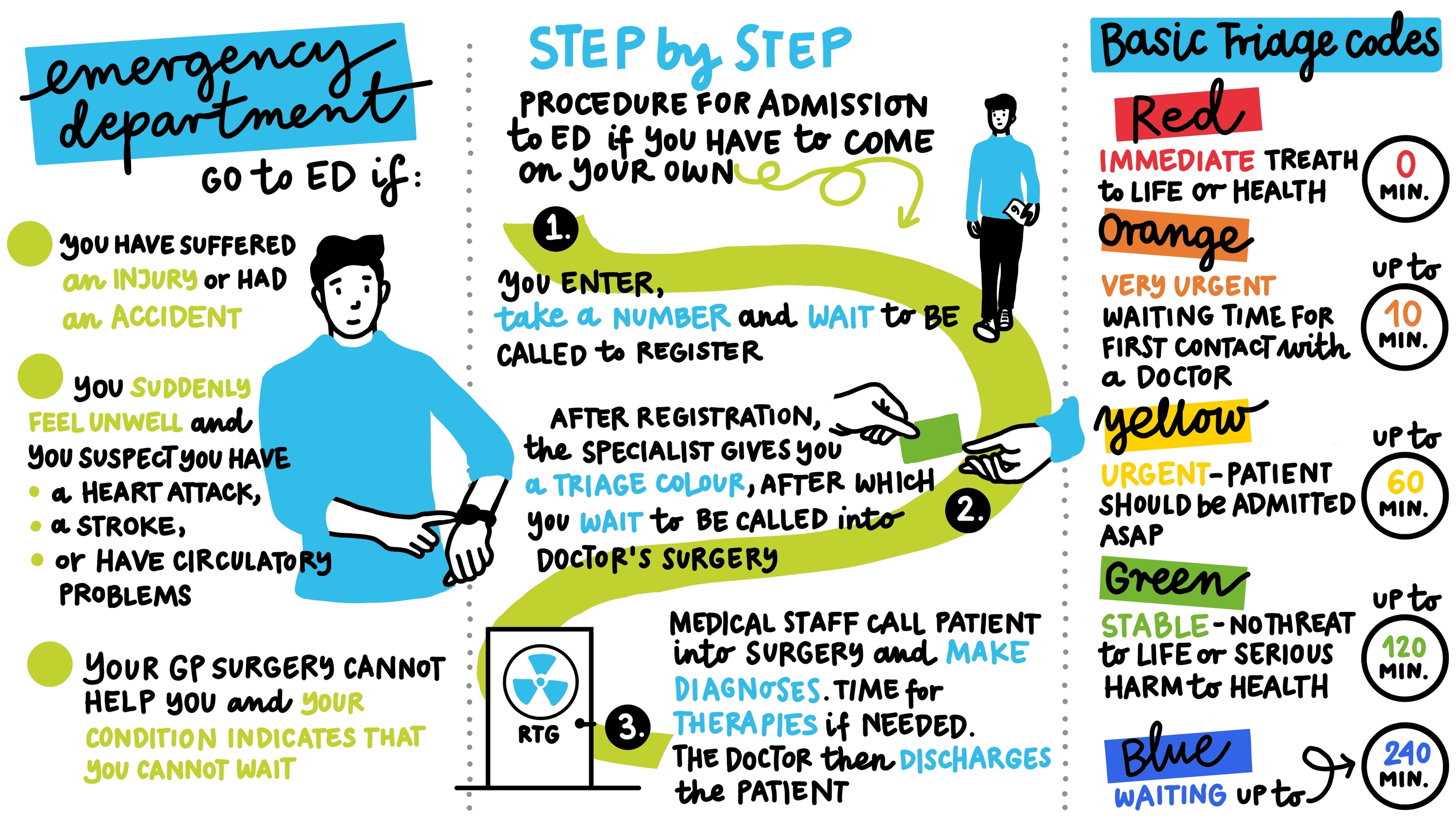Every patient has the right to health services that meet the requirements of current medical knowledge. They also have the right to receive immediate medical care if their health or life is at risk.
What is the difference between a SOR (ED) and a NiŚOZ?
Szpitalny Oddział Ratunkowy (SOR) – Hospital Emergency Department (ED)
A hospital emergency department, known as SOR in Polish, is a separate organisational unit of a hospital where medical personnel provide health services to persons in a state of emergency. Anyone who presents themselves at the ED will be admitted. It is irrelevant whether the person has come by themselves or has been brought by an emergency medical team. However, the order in which patients are admitted is not determined by the order in which they arrive at the ED, but by the severity of their medical condition as determined by the staff.
Nocna i Świąteczna Opieka Zdrowotna (NiŚOZ) – Night and Holiday Care
Within the framework of night and holiday healthcare, every insured patient should receive medical care in the event of sudden illness or deterioration of health (note: this is not a medical emergency). The care is provided to patients outside the working hours of primary care physicians and includes the provision of health services that arise solely from primary care.
In both cases, you do not need to bring any referral from a doctor, nor does the patient’s place of residence matter. Anyone can receive medical care anywhere in the country.
Who and in which situations should visit the ED?
Only patients who require medical assistance in the event of a life-threatening medical emergency should visit the hospital emergency department. A so-called emergency condition consists of a sudden appearance of symptoms of deteriorating health, the immediate consequence of which may lead to serious damage to bodily functions, bodily harm, or loss of life. Such symptoms include, for example, seizures, sudden severe abdominal pain, gastrointestinal bleeding, severe bleeding from the genital tract or urinary tract, trauma, or poisoning. These conditions require immediate medical attention and treatment.
The assessment of whether a patient is in an emergency condition is the sole responsibility of the healthcare provider.
![]()
A visit to the SOR is not a substitute for the services provided by a primary care physician or a specialist physician. The provision of health services in the SOR consists of initial diagnosis and the undertaking of treatment necessary to stabilise the vital functions of a person in a health emergency. Once the patient has been diagnosed and the vital functions stabilised, they are discharged or, if they require further treatment, transferred to a unit that can provide long-term specialised care. In that case, the hospital emergency department should provide the patient with transport to the relevant medical unit.
The healthcare entity within which the SOR operates does not have the right to refuse to provide healthcare services to a person who needs immediate provision of such services due to a threat to life or health.
Who and in which situations should visit the NiŚOZ?
Any patient with health insurance who, in the event of a sudden illness or deterioration of health, does not have the option of visiting a primary care physician. The patient can also use this form of assistance if there is a concern that waiting for an outpatient clinic to open may have a significant adverse effect on their health.
Patients can seek care at the NiŚOZ clinics from Monday to Friday between 6 p.m. and 8 a.m. the following morning (i.e. when regular clinics are closed) and 24 hours a day on Saturdays, Sundays, and other public holidays.
In both cases, the patient’s condition should always be recorded in the patient’s medical record. If a doctor refuses to provide health services, this information should also be included. The refusal to provide healthcare cannot be attributed to organisational issues within the clinic, such as insufficient medical staffing or the absence of a relevant specialised medical professional.
What documents can you obtain after a visit to the SOR and NiŚOZ?
Having personally assessed the patient, the doctor will decide whether the patient is entitled to sick leave or a referral to a specialist clinic for examination. Such documents can only be issued by the doctor who has assessed the patient’s health.
Therefore, if a SOR or NiŚOZ doctor sees a reason to issue sick leave and has been authorised to do so by the Social Insurance Institution, they must issue the certificate themselves – they are not allowed to pass the responsibility onto the patient’s primary care physician. Doctors authorised by the Social Insurance Institution to issue certificates are obliged to comply with the rules concerning the adjudication of temporary inability to work and to perform their duties under the Act of 25 June 1999 on cash benefits from social insurance in the event of sickness and maternity.
SOR and NiŚOZ do not provide follow-up visits concerning treatment started earlier. If it is deemed not necessary, you will also not receive a referral to a specialist, a routine health certificate, or a prescription for medication taken in connection with chronic illness.
Where to find detailed information on the functioning of the SOR and NiŚOZ?
Every healthcare provider must inform patients about the rules of their facility. Information concerning, among other things, the extent of the healthcare services provided in this facility should be available in printed form in an easily accessible place (on the door of the clinic, on the information board, etc.).
Information on the facilities in a given region that provide medical assistance within the framework of SOR can be found on the website of the National Health Fund (https://zip.nfz.gov.pl/GSL/) under the tab Emergency Care. Download here: Hospital Emergency Departments in Mazovia — addresses and phone numbers
You can find a list of night and holiday healthcare facilities on the website of the National Health Fund. Download here: Addresses and phone numbers of night and holiday healthcare facilities in Mazovia, with information on whether the facility employs a paediatrician.
You should also be able to obtain such information from your primary care physician (family doctor) and the relevant voivodeship branch of the NFZ or its delegation.










